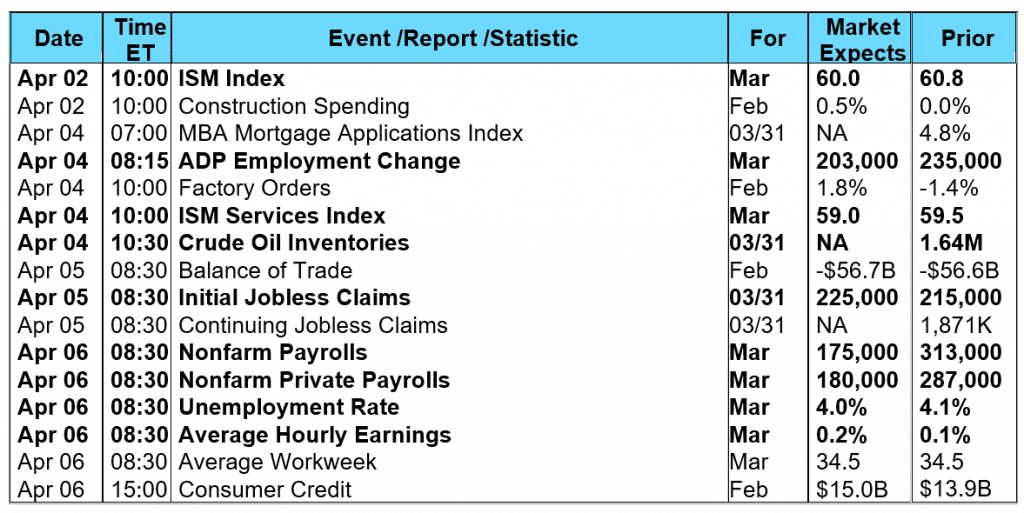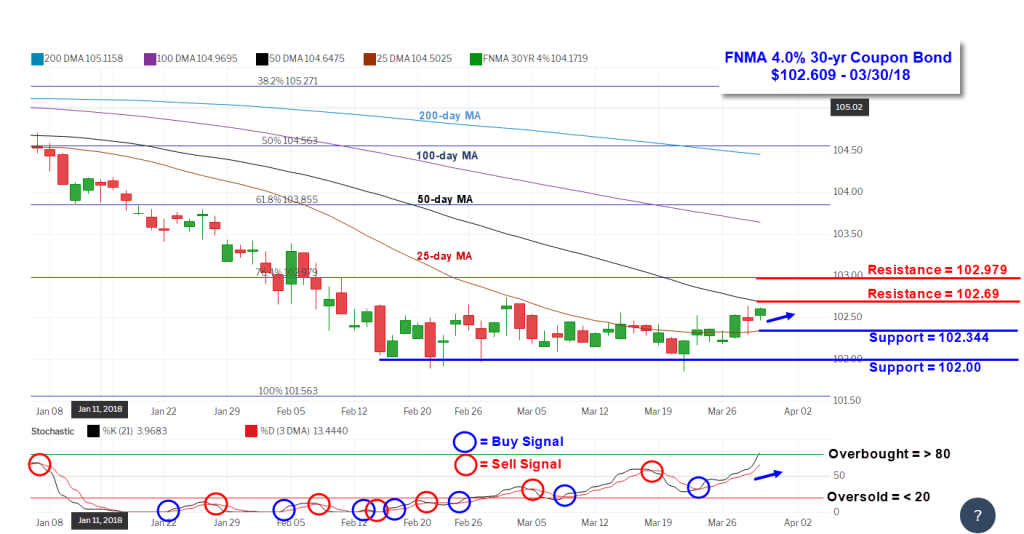The stock market, although continuing to show significant volatility, reacted favorably to a decision by China to not implement retaliatory tariffs on its imports of U.S. soybeans and commercial aircraft, easing fears of a trade war at least for the time being. There were also reports that U.S. and Chinese officials were negotiating to protect intellectual property rights of U.S. technology companies while opening China’s markets to U.S. goods. The volatility seen in stocks during the week, and especially in the technology sector, prompted investors to seek a safer haven in the Treasury market as the yield on the benchmark 10-year Treasury note reached its lowest level since early February. In housing, Pending Home Sales rebounded in February by 3.1% after falling by a downwardly revised 5% in January. Economists had predicted only a 2.5% gain for the month. However, even with February’s gain, Pending Sales are 4.1% lower from the prior year as available inventory has shrunk while home prices have climbed. The National Association of Realtors chief economist, Lawrence Yun, remarked “The minuscule number of listings on the market and its adverse effect on affordability are squeezing buyers and suppressing overall activity.” Last Tuesday, Standard & Poor's reported its S&P CoreLogic Case-Shiller national home price index advanced 6.2% in January from a year earlier in addition to a 6.3% annual gain in December. As for mortgage activity, the number of mortgage applications increased according to the latest data from the Mortgage Bankers Association’s (MBA) weekly mortgage applications survey. The MBA reported their overall seasonally adjusted Market Composite Index (application volume) increased by 4.8% during the week ended March 23, 2018. The seasonally adjusted Purchase Index increased by 3.0% from the week prior while the Refinance Index increased 7.0%. Overall, the refinance portion of mortgage activity rose to 39.4% from 38.5% of total applications from the prior week. The adjustable-rate mortgage share of activity remained unchanged at 7.0% of total applications. According to the MBA, the average contract interest rate for 30-year fixed-rate mortgages with a conforming loan balance increased to 4.69% from 4.68% with points decreasing to 0.43 from 0.46. For the week, the FNMA 4.0% coupon bond gained 25.0 basis points to close at $102.609 while the 10-year Treasury yield decreased 7.28 basis points to end at 2.7407%. The major stock indexes moved higher for the week. The Dow Jones Industrial Average rose 569.91 points to close at 24,103.11. The NASDAQ Composite Index climbed 70.77 points to close at 7,063.44. The S&P 500 Index gained 52.61 points to close at 2,640.87. Year to date on a total return basis, the Dow Jones Industrial Average has fallen 2.49%, the NASDAQ Composite Index has gained 2.32%, and the S&P 500 Index has lost 1.22%. Economic Calendar - for the Week of April 2, 2018 Economic reports having the greatest potential impact on the financial markets are highlighted in bold.  Mortgage Rate Forecast with Chart - FNMA 30-Year 4.0% Coupon Bond The FNMA 30-year 4.0% coupon bond ($102.609, +25.0 bp) traded within a narrower 45.3 basis point range between a weekly intraday low of $102.188 on Monday and a weekly intraday high of $102.641 on Wednesday before closing the week at $102.609 on Thursday. Mortgage bond prices were able to rise above their 25-day moving average resistance level ($102.34) that now reverts to nearest support, and continued higher toward their 50-day moving average ($102.69) where the next level of technical resistance is located. The chart shows the bond is approaching the “overbought” level as it approaches the 50-day moving average, so while there is still room for price improvement, the bond may have a tough time breaking through this level. If the bond can manage to move above the 50-day moving average, mortgage rates should improve slightly. However, if the bond is turned away from this level, mortgage rates would hold steady near current levels.
Mortgage Rate Forecast with Chart - FNMA 30-Year 4.0% Coupon Bond The FNMA 30-year 4.0% coupon bond ($102.609, +25.0 bp) traded within a narrower 45.3 basis point range between a weekly intraday low of $102.188 on Monday and a weekly intraday high of $102.641 on Wednesday before closing the week at $102.609 on Thursday. Mortgage bond prices were able to rise above their 25-day moving average resistance level ($102.34) that now reverts to nearest support, and continued higher toward their 50-day moving average ($102.69) where the next level of technical resistance is located. The chart shows the bond is approaching the “overbought” level as it approaches the 50-day moving average, so while there is still room for price improvement, the bond may have a tough time breaking through this level. If the bond can manage to move above the 50-day moving average, mortgage rates should improve slightly. However, if the bond is turned away from this level, mortgage rates would hold steady near current levels. 
 Mortgage Rate Forecast with Chart - FNMA 30-Year 4.0% Coupon Bond The FNMA 30-year 4.0% coupon bond ($102.609, +25.0 bp) traded within a narrower 45.3 basis point range between a weekly intraday low of $102.188 on Monday and a weekly intraday high of $102.641 on Wednesday before closing the week at $102.609 on Thursday. Mortgage bond prices were able to rise above their 25-day moving average resistance level ($102.34) that now reverts to nearest support, and continued higher toward their 50-day moving average ($102.69) where the next level of technical resistance is located. The chart shows the bond is approaching the “overbought” level as it approaches the 50-day moving average, so while there is still room for price improvement, the bond may have a tough time breaking through this level. If the bond can manage to move above the 50-day moving average, mortgage rates should improve slightly. However, if the bond is turned away from this level, mortgage rates would hold steady near current levels.
Mortgage Rate Forecast with Chart - FNMA 30-Year 4.0% Coupon Bond The FNMA 30-year 4.0% coupon bond ($102.609, +25.0 bp) traded within a narrower 45.3 basis point range between a weekly intraday low of $102.188 on Monday and a weekly intraday high of $102.641 on Wednesday before closing the week at $102.609 on Thursday. Mortgage bond prices were able to rise above their 25-day moving average resistance level ($102.34) that now reverts to nearest support, and continued higher toward their 50-day moving average ($102.69) where the next level of technical resistance is located. The chart shows the bond is approaching the “overbought” level as it approaches the 50-day moving average, so while there is still room for price improvement, the bond may have a tough time breaking through this level. If the bond can manage to move above the 50-day moving average, mortgage rates should improve slightly. However, if the bond is turned away from this level, mortgage rates would hold steady near current levels. 
